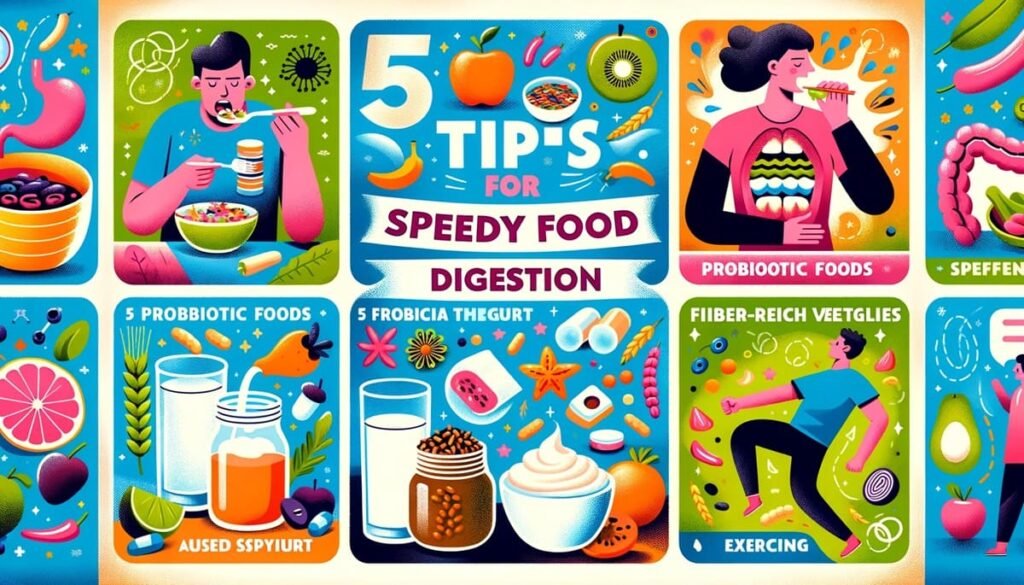
Efficient digestion is crucial for maintaining good health and well-being. It helps your body absorb nutrients effectively and prevents discomforts such as bloating, gas, and indigestion. Here are five expert tips to enhance your digestive process and ensure that your meals are digested more quickly and efficiently.
Contents
1. Chew Your Food Thoroughly
Why It’s Important: Chewing is the first step of digestion. The more you chew, the easier it is for your stomach to process the food. Chewing thoroughly breaks down food into smaller pieces, mixes it with saliva which contains digestive enzymes, and prepares it for easier digestion downstream.
How to Implement: Take smaller bites and chew each bite until the food is liquefied. This not only makes digestion easier but also helps you savor your meal and may lead to eating less, as you give your body time to recognize when it’s full.
2. Stay Hydrated
Why It’s Important: Proper hydration is critical for good digestion. Water helps break down food so that your body can absorb the nutrients. It also softens stool, which helps prevent constipation.
How to Implement: Aim to drink at least 8 glasses of water a day. However, try to minimize fluid intake during meals to prevent diluting stomach acid, which is crucial for breaking down food.
3. Incorporate Probiotics
Why It’s Important: Probiotics are beneficial bacteria that live in your digestive system and help break down food more efficiently. They also enhance nutrient absorption and fortify the digestive tract against gastrointestinal issues.
How to Implement: Include probiotic-rich foods like yogurt, kefir, sauerkraut, and kombucha in your diet. Alternatively, consider taking a probiotic supplement, especially if you recently used antibiotics.
4. Increase Fiber Intake
Why It’s Important: Fiber helps keep the digestive system flowing by pushing food through the gastrointestinal tract. This aids in the quick passage of food and prevents issues like constipation and bloating.
How to Implement: Add more fruits, vegetables, whole grains, and legumes to your diet. Aim for a mix of soluble fiber (which absorbs water and slows digestion, good for managing diarrhea) and insoluble fiber (which adds bulk to stool and helps food pass more quickly through the stomach and intestines).
5. Exercise Regularly
Why It’s Important: Regular physical activity helps food travel through your digestive system more quickly. It can also help you maintain a healthy weight, which is beneficial for digestive health.
How to Implement: Engage in at least 30 minutes of moderate exercise most days of the week. Even a quick walk after meals can help stimulate digestion.
FAQs About Speedy Digestion
Q: Can stress affect digestion?
A: Yes, stress can interfere with digestion. It can slow down or speed up the process, leading to various digestive issues. Managing stress through mindfulness, meditation, or therapy can be beneficial.
Q: What should I avoid for better digestion?
A: Reduce your intake of high-fat foods, which can slow digestion. Also, limit consumption of highly processed foods and excessive caffeine or alcohol.
Q: How long should I wait to exercise after eating?
A: It’s best to wait at least an hour after a large meal before engaging in vigorous exercise to allow your stomach to begin the digestion process without discomfort.
Q: Can overeating affect digestive speed?
A: Yes, overeating can slow down digestion by putting extra pressure on the digestive system, making it work harder and longer to process food.
Conclusion
Improving your digestion involves simple but effective habits like chewing thoroughly, staying hydrated, incorporating probiotics, increasing fiber intake, and exercising regularly. By integrating these expert tips into your daily routine, you can enhance your digestive efficiency, enjoy your meals more, and ultimately support your overall health and wellness.